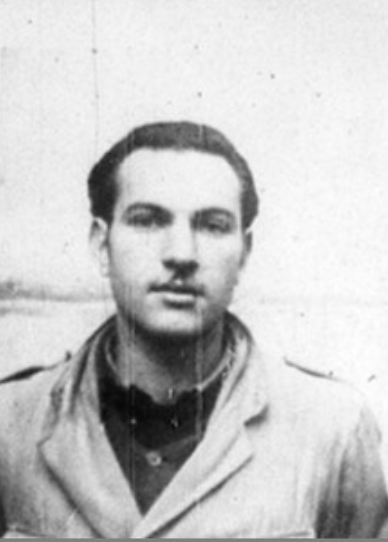Rose Molina Gonzalez
HONS 2011J- Spanish Civil War in Literature and Film
Final Essay
Professor Hernandez-Ojeda
Milton Morris White
Personal Statement
Coming into my Spanish Civil War course at Hunter College, I did not have any expectations for the class or prior knowledge of this historical event. In fact, my grandmother was the one who pushed me to enroll in the class as she believed I would benefit from it. My initial impression was that it was going to be another history course with facts and dates. I was never a fan of history and so, I thought I would make the most out of this course since we would be looking at the Spanish Civil War through film and literature instead of a textbook. As a result, I found that my initial impression was wrong. I left the course, taught by Professor Hernandez-Ojeda, with a different perspective of the events that took place in Spain. This course has shown me that history is more than the events that took place as these events are the reason we stand here today.
This is where I learned the importance of legacy. When thinking of a historical event, we see it as something that has happened long ago and something we cannot touch. Thinking this way inhibits us to realize that the reason we are taught history is because history always leaves a legacy. In the case of the Spanish Civil War, the outcome left behind documents, photos, and laws that showcased it all. However, the biggest thing this event left behind were veterans, families, and civilians. Often times when we visualize wars, we see two groups with different ideologies fighting against each other. In the Spanish Civil War, it was the Nationalists, or the Fascists, versus the Republic. However, these groups consisted of people who lived, breathed, and had their own dreams like we do. In textbooks, only the people who had a big impact in these wars and the aftermath have their names written down and published. In an event that consisted of millions of people, only a few are given mentions. That is why this project is an important aspect of the course. It deepens our understanding of the events that took place in the war and Spain and more importantly, brings life back to those soldiers who fought on the Republican side, more specifically those in the Abraham Lincoln Brigade. Because of that, I feel deeply passionate in writing this essay about a veteran named Milton Morris White, known as Milton White, and how he carried on his life after the Spanish Civil War. I find it to be my responsibility, as a student in this course, to celebrate his life throughout my essay and the legacy left behind through him. White wasn’t one of the big names you see when you research the Spanish Civil War but he was a person that influenced those around him with his artistic talents and by the way he carried himself wherever he went. Today, the memory of Mr. White lives through his daughter, Judith Ross, to whom I had the pleasure of speaking about White’s life as a veteran, musician, actor, and a father. His story is also shared through his writings during the Spanish Civil War that are stored in the Abraham Lincoln Brigade Archives at NYU.
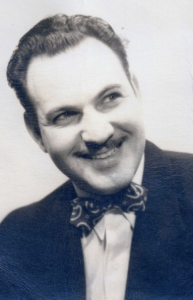
Milton Morris White
Introduction
Some background information: the Spanish Civil War took place between 1936 and 1939. It was an uprising of Fascists led by Francisco Franco against the democratically elected Republican Government. Workers, farmers, labor unionists and many other Spanish civilians sided with the Republic of Spain. During this time, there were class struggles, a war of religion and a fight between dictatorship and republican democracy. Although it was a civil war, Franco’s forces were assisted with arms, artillery, fighters and arial bombardments from German and Italian Fascists-a prelude to methods that would be used against allies in WWII. Many individuals from other countries believed they had a duty to help resist the Fascists and support the young democratic government and civilians who were innocent victims. One group that participated was known as the Abraham Lincoln Brigade. It was formed by volunteers from the United States: soldiers, nurses, and technicians. Many were young men and women who were students like me. Milton White was one of these volunteers who served as a soldier in the Abraham Lincoln Brigade; although he did not have much of an impact in the events from the war like other well-known figures, his story is still important in understanding what happened. It is his story, like the stories of all the other soldiers, that reminds us that these were real life events that happened to real people; and that the effects of war stay with a person throughout his life and are even carried on through generations. In this essay we will be focusing on the life and personal experiences of Mr. White.
Life Before Spanish Civil War
Milton Morris White was born in Cleveland, Ohio in 1917, during the first World War. His parents were Russian-Jewish immigrants, Ephim and Tanya White. His father, Ephim, had been a merchant marine, born in the port city of Odessa in what is now Ukraine. His mother, Tanya was from a large, comfortable Jewish family in Moscow, Russia. Milton’s younger sister, Lenora Marcia White, was born in 1929. Before she was born, at the age of two, Milton moved with his parents to Brooklyn, New York. In New York both Ephim and Tanya (who called herself Tena) were affiliated with local Communist groups focused mostly on economic issues such as helping poor women with children and it was believed that Tanya was a leader. Milton was left-handed but he was not permitted to use his left hand at school, so he learned to become ambidextrous. His dream was to become an actor. Interestingly, at the age of 16, he ran off to California and managed to get hired as an extra in a couple of films. Milton was a member of the New Theatre League, a national nonprofit organization dedicated to training actors, directors, technicians, playwrights, teachers, and theater organizers to build a people’s theater. (Ross) He was also a musician: his first instruments were the violin and the guitar. Besides growing up with artistic aspirations, White’s political views were influenced by his parents, particularly his mother, and by the people he met in various workers organizations and youth theatre groups. White joined the war in Spain with his parents’ encouragement. He was only 19 years old when he left for Spain, an experience which greatly impacted his life.
During the Spanish Civil War
While he was in service, White suffered several injuries. According to his daughter, Judith Ross, White wounded his leg and had residual shrapnel in various parts of his body. He had reoccurring bouts of malaria (Ross) which prevented him from donating blood. White never spoke about his time at war with any of his family or friends. The subject was avoided, not uncommon amongst soldiers who saw battle and suffered from PTSD. Although White did not speak directly about his experiences, much of the war-related material he kept provides an insight into his thoughts. Writings obtained in the Abraham Lincoln Brigade Archives at the NYU Library were letters he exchanged with his parents and close friends, his own personal stories and poems, and other documents about the Spanish Civil War. In one of the letters, White gets a message from his father telling him that his mother was ill and refused to undergo a serious operation until he came back home. There was another letter that showed that his family almost thought he was lost in war because they had not received any letters from him in over seven months (Folder 4). Therefore, it seems that keeping communication with his family was at times hard to do. However, his parents’ letters to White included lists of things that they had sent to him: a package that included cigarettes, chocolate, candy, canned fruit, and other items such as a pipe and writing paper. With these supplies, he was able to write his stories and copy lyrics of songs he learned during his time away from home.
Some of the documents White kept during the war that were probably not written by him include a mix of stories and well-known songs that he received from his fellow soldiers. The writings entitled “Personal Impressions,” were a first-person point of view of what was witnessed in Spain. One piece of writing includes descriptions of schools and churches in ruins and the expressions and actions of the civilians. Another describes the excavation of children, husbands, and wives who died in the barbaric Fascists bombardments. The people who watched all this had no tears, just expressions of hatred against their common enemy, for they have seen this happen time and time again. The writer comes to the conclusions that, “When you see a scene like this you know why it is that Spaniards will never give up but will carry on and win victoriously to remove this scene for ever and ever from the face of this earth.” (Folder 14) Another “Personal Impressions” writing highlights a fellow soldier named Tommy who was the greatest gunman the writer had ever seen. However, Tommy had a drinking problem and he was always drunk but that did not stop him from fighting. (Folder 14) In fact, the writer explains that he admired Tommy for being brave and never being afraid of anyone. Tommy was sent off to a different site and so they never saw each other again.
Moving onto other stories, there is one that talks about a Catalonian mother and her three children. The mother made sure her kids were ready for school every day and though food was scarce she always managed to make sure they were well-fed even if that meant she needed to go hungry. At the time, her husband was fighting at the front for many months but knowing he was still fighting pushed her to continue to do her best in taking care of her family. Unfortunately, one day as she sent her children to school, “the black dropper of Death” came by and a bomb went off near her children’s school, killing them. Even though this traumatic event happened in front of her eyes, she looked up into the sky and said, “You don’t scare me. Until my dying day I swear before God who is my witness that you shall pay and pay dearly, for all the little Joses and Carmens that you destroy.” (Folder 15) Although the writings White kept spoke about death and the bloody scenes of war, they showcase his admiration for the courage and will-power of the Spanish civilians fighting against the nationalists. It seems that despite what White or the other soldiers may have witnessed, it is the testimonies of these people that encouraged him to keep going in the fight and therefore, he saved these accounts and really valued them.
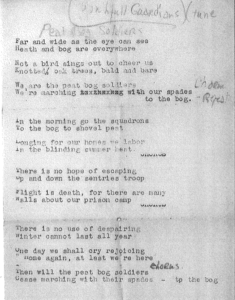
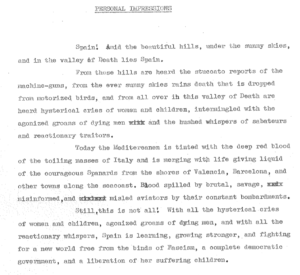
Life After the Spanish Civil War
On December 20th, 1938, almost two years after White arrived in Spain, he and many other veterans returned to the Unites States. It has been said that White came back overjoyed to see familiar faces in his neighborhood and even brought back a guitar from Spain, which he will use to play music for his loved ones. (Fernandez) Just a year after returning from Spain, in December 1939, White married Miriam Lifshitz and started a family. His first child, Judith, was born in 1941 and his daughter Joanne in 1948. In 1952, the family moved from Brooklyn to Queens, NY and lived in a garden apartment that had a large basement where he would start creating his theater. According to Judith Ross, her father was an adventurous man who was always exploring and he had a love for people. One time when she was 14 years old, strolling with her parents in a small village square while waiting for a movie theater to open, White spontaneously joined a band playing Spanish music on a balcony and he played the guitar with them. White kept the culture of Spain in his lifestyle as he loved the food and taught himself Spanish tunes on the guitar to share with his friends. White continued to play Spanish music but also focused on his interests in theater and eventually photography.
White kept up with his responsibilities as a father and a provider for his family but he continued nurturing his artistical interests. In the theater he built with his friends in the basement of his apartment building, he installed decommissioned theater seats which he had solicited as donations to create a professional theatrical environment. When performing, he often had difficulty memorizing text, and his family’s inside joke was that White always had words written on his hands and wrists to help him remember his lines. He showcased classic American Plays, including “Goodbye, My Fancy” and “Separate Tables.”
White was interested in jazz and blues as he listened to artists like Josh White and Muddy Waters, John Coltrane, and Dizzy Gillespie. He held concerts at home. He did not write music, but he taught himself Flamenco and an array of Spanish songs; he had a good ear for music and was able to pick up songs by just listening to recordings. Along with music and theater, White became interested in photography. His cameras meant a lot to him and Ross explained that in addition to nature and urban scenes he took numerous pictures of his family; she has memories of posing for her father. Until the day he passed, White continued his life as a creative individual who loved to share his interests with all of those around him.
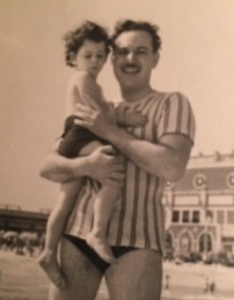
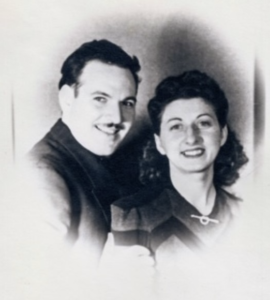
White’s Legacy
Before and after his service in the Spanish Civil War, Milton White remained a courageous adventurous individual who was not afraid of risks. People who knew him thought he was talented, and they appreciated that he shared his gifts with them. He is remembered as a congenial, generous man who loved life and loved people. He always put himself out there, unafraid, and always stayed curious. Despite the impact the war had on his youth, White grew up to be an individual that others looked up to for his perseverance. The legacy lives through the lives he has touched, such as his daughters, Judith and Joanne and his son Howard. In our conversation about Mr. White, Ross highlights that her father always encouraged her to be brave, trust herself, not be afraid to take risks and to try new things and because of that she had that same confidence in all her endeavors. Ross wishes that her father be remembered as a man who was always willing to start over again and who woke up and faced every day with optimism. He was always present and loved life and meeting people. Ross believes that if White were here today, he would encourage others to, as he said to her once, “Follow the stars and follow your dreams.”
The legacy of the Spanish Civil War that lives through White has really touched me and he has inspired me to carry myself as fearlessly as he has and I hope those who read his story are inspired as well.
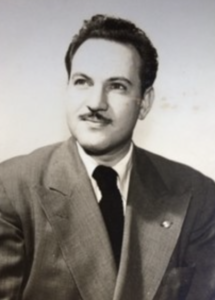
Works Cited
Fernandez, James D. “Treasures from the Archives (2): Pre-Mature Americans.” The Volunteer.
Published 31 March 2011. Accessed 14 October 2020.
https://albavolunteer.org/2011/03/treasures-from-the-archives-2-milton-white/
Ross, Judith. Personal Interview. 16 November 2020.
“White, Milton.” The Abraham Lincoln Brigade Archives. Accessed 14 October 2020.
https://alba-valb.org/volunteers/milton-white/
White, Milton Morris. Letters from Ephim and Tanya White. Folder 4. Milton White Papers.
Tamiment Library and Robert F. Wagner Labor Archive. Elmer Holmes Bobst Library, NYU. Accessed 19 November 2020.
White, Milton Morris. Writings. Folder 14. Milton White Papers. Tamiment Library and Robert
- Wagner Labor Archive. Elmer Holmes Bobst Library, NYU. Accessed 19 November 2020.
White, Milton Morris. Writings: Plays, Poems, and Songs. Folder 15. Milton White Papers.
Tamiment Library and Robert F. Wagner Labor Archive. Elmer Holmes Bobst Library, NYU. Accessed 19 November 2020.

